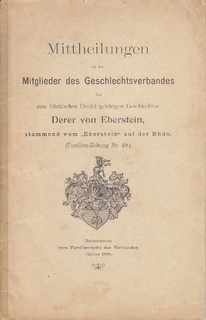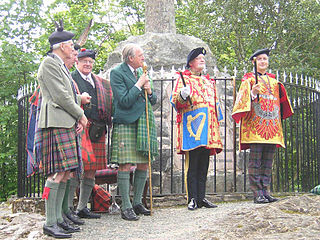
A coat of arms is a heraldic visual design on an escutcheon, surcoat, or tabard. The coat of arms on an escutcheon forms the central element of the full heraldic achievement which in its whole consists of: shield, supporters, crest, and motto. A coat of arms is traditionally unique to an individual person, family, state, organization or corporation.

The Genealogical Office is an office of the Government of Ireland containing genealogical records. It includes the Office of the Chief Herald of Ireland, the authority in Ireland for heraldry. The Chief Herald authorises the granting of arms to Irish bodies and Irish people, including descendants of emigrants. The office was constituted on 1 April 1943 as successor to the Ulster King of Arms, established during the Tudor period of the Kingdom of Ireland in 1552. The Ulster King of Arms' duties were taken over by the Norroy and Ulster King of Arms.

Count is a historical title of nobility in certain European countries, varying in relative status, generally of middling rank in the hierarchy of nobility. The etymologically related English term, "county" denoted the land owned by a count. Equivalents of the rank of count exist or have existed in the nobility structures of some non-European countries, such as hakushaku during the Japanese Imperial era.

The Titles of Nobility Amendment is a proposed amendment to the United States Constitution. The 11th Congress passed it on May 1, 1810, and submitted to the state legislatures for ratification. It would strip United States citizenship from any citizen who accepted a title of nobility from an "emperor, king, prince or foreign power." On two occasions between 1812 and 1816, it was within two states of the number needed to become part of the Constitution. Congress did not set a time limit for its ratification, so the amendment is still pending before the states. Ratification by an additional 26 states is now needed for its adoption.

An officer of arms is a person appointed by a sovereign or state with authority to perform one or more of the following functions:

In heraldry, an armiger is a person entitled to use a heraldic achievement either by hereditary right, grant, matriculation, or assumption of arms. Such a person is said to be armigerous. A family or a clan likewise.
The McClatchy Company, commonly referred to as simply McClatchy, is an American publishing company based in Sacramento, California, and incorporated in Delaware. It operates 29 daily newspapers in fourteen states and has an average weekday circulation of 1.6 million and Sunday circulation of 2.4 million. In 2006, it purchased Knight Ridder, which at the time was the second-largest newspaper company in the United States. In addition to its daily newspapers, McClatchy also operates several websites and community papers, as well as a news agency, McClatchyDC, focused on political news from Washington, D.C.

Uradel is a genealogical term introduced in late 18th-century Germany to distinguish those families whose noble rank can be traced to the 14th century or earlier. The word stands opposed to Briefadel, a term used for titles of nobility created in the early modern period or modern history by letters patent. Since the earliest known such letters were issued in the 14th century, those knightly families in northern European nobility whose noble rank predates these are designated uradel.

Sir Thomas Innes of Learney (1893–1971) was Lord Lyon from 1945 to 1969, after having been Carrick Pursuivant and Albany Herald in the 1920s and 1930s. He was a very active Lord Lyon, strongly promoting his views of what his office was through his writings and pronouncements in his Court. In 1950, he convinced the Scots Law Times to start publishing the decisions made in Lyon Court. By ruling on uncontested petitions, he was able to expound many of his theories in court but not under review of his superior court, and get them published in the judicial record. His treatise, Scots Heraldry, was first published in 1934 when he was Carrick Pursuivant; then a second, enlarged edition came out in 1956, and it has practically eclipsed earlier works on the subject. Following his retirement as Lord Lyon in 1969, he was appointed Marchmont Herald.

A private officer of arms is one of the heralds and pursuivants appointed by great noble houses to handle all heraldic and genealogical questions.

Heraldry in the United States was first established by European settlers who brought with them the heraldic customs of their respective countries of origin. As the use of coats of arms may be seen as a custom of royalty and nobility, it had been debated whether the use of arms is reconcilable with American republican traditions. Families from English, Scottish, Irish, Welsh, German, and other European nations with a heraldic tradition have retained their familial coat of arms in the United States. Several founding fathers also employed personal arms and a great number of Americans continue to do so.

The Herald-Sun is an American, English language daily newspaper in Durham, North Carolina, published by the McClatchy Company.

Princess Maria Carolina Christina of Bourbon-Parma, Marchioness of Sala, is the fourth and youngest child of Princess Irene of the Netherlands and Carlos Hugo, Duke of Parma, and is a member of the Royal and Ducal House of Bourbon-Parma, as well as of the Dutch Royal Family.
A heraldic authority is defined as an office or institution which has been established by a reigning monarch or a government to deal with heraldry in the country concerned. It does not include private societies or enterprises which design and/or register coats of arms.

The Spartanburg Herald-Journal is a daily newspaper, the primary newspaper for Spartanburg, South Carolina, United States.

Nobility is a social class normally ranked immediately below royalty and found in some societies that have a formal aristocracy. Nobility possesses more acknowledged privileges and higher social status than most other classes in society. The privileges associated with nobility may constitute substantial advantages over or relative to non-nobles, or may be largely honorary, and vary by country and era. As referred to in the Medieval chivalric motto noblesse oblige, nobles can also carry a lifelong duty to uphold various social responsibilities, such as honourable behaviour, customary service, or leadership positions. Membership in the nobility, including rights and responsibilities, is typically hereditary.
The Irish nobility consists of persons who historically fell into one or more of the following categories of nobility.











